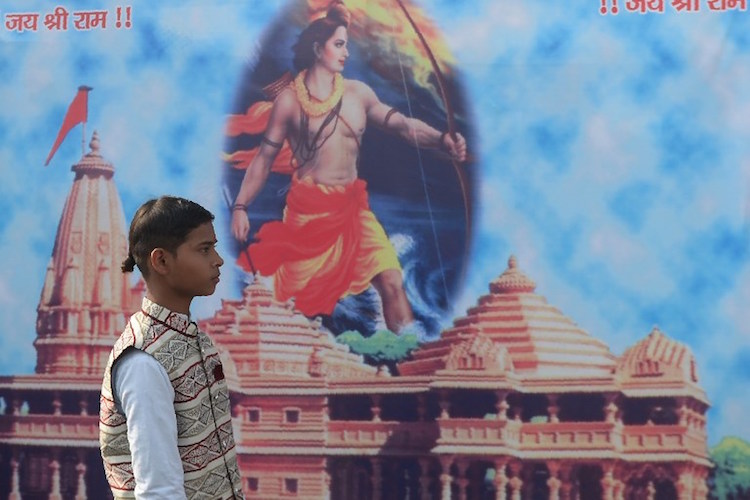Hindu groups step up Ayodhya temple campaign in what critics claim is an electoral gimmick to gain votes for the BJP

An Indian youth from the Veda Vidyalaya religious school takes part in a procession organised by a Hindu nationalist group to mark ‘Shaurya Diwas’, the 25th anniversary of the demolition of the 16th century Babri Mosque in Ayodhya, in Allahabad on Dec. 6, 2017. Babri Masjid, constructed in 1527, was destroyed by Hindu hardliners on Dec. 6, 1992, claiming it was built on the site of the birth place of the Hindu deity Ram, sparking off countrywide Hindu-Muslim riots. (Photo by Sanjay Kanojia/AFP)
April 26, 2018
Religious minorities in India sense a sectarian divide ahead of the 2019 national election as hard-line Hindu leaders make provocative statements to galvanize voters in the name of religion.
India’s ruling Bharatiya Janata Party (BJP) has kept alive a dispute over construction of a temple that propelled the party to political prominence almost three decades ago.
Hindu groups have intensified a campaign to build the temple in Ayodhya, a town in Uttar Pradesh state that is considered the birthplace of Hindu lord Ram.
The temple has been an emotive issue since 1992 when Hindu zealots demolished a mosque there, claiming 16th century Muslim invader Babur built it after demolishing a temple that stood on Ram’s birthplace.
“It is our responsibility to restore what was demolished within the country. The temple should be built where it actually was. We are ready to fight for it,” Mohan Bhagwat, head of Hindu nationalist group Rashtriya Swayamsevak Sangh (RSS), told a gathering of his volunteers on April 16.
The Hindu frenzy over the temple has helped the BJP politically but proved disastrous for the nation. The mosque demolition triggered nationwide riots resulting in the death of about 2,000 people and destruction of property worth US$3.6 billion.
The riots and mosque demolition were the culmination of a chariot march that then BJP leader Lal Krishna Advani started in 1990. It helped the party come to political prominence in 1991 by gaining 120 seats in the 543-seat national parliament.
The 1996 election saw the BJP become the largest single party with 160 seats, projecting itself as the only champion of Hindu interests in India.
With a national election due by May next year, the RSS — regarded as the BJP’s ideological mentor — has termed the temple construction as a question of survival for Hindu pride and culture.
The issue is “nothing but an electoral gimmick,” said Nazir Afaqi, an Urdu author and activist in Uttar Pradesh capital Lucknow. “It is aimed to instigate the masses. All the RSS is doing is to secure the vote bank for the BJP for the 2019 polls.”
He said Hindu groups have already intensified their anti-Muslim campaign. “Calls for constructing the Ram temple could act as a spark to instigate religious tensions across the country once again,” Afaqi said.
Hindus form 966 million or 80 percent of India’s population of 1.3 billion. Muslims account for 172 million or 14 percent, mostly living in pockets. Christians, the second largest minority, comprise 29 million or 2.3 percent.
Both Christian and Hindu groups have been complaining of violence at the hands of Hindu groups, especially in northern states ruled by BJP-led governments. While India has scores of Hindu groups, the RSS is regarded as the umbrella organization at the forefront of a campaign to make India a Hindu-only nation.
Several places have witnessed Hindu groups’ attempts to divide people on religious lines, Muslim scholar Molvi Ghulam Ali told ucanews.com.
“There were instances of Hindu fanatics brandishing swords and arms in the Muslim-majority areas of India. The latest example was in West Bengal where communal clashes broke out when Hindu fanatics brandished swords during a religious rally,” Ali said.
Religious violence in India has increased since the BJP came to power in May 2014.
According to government data, 111 persons were killed and at least 2,384 injured in 822 cases of sectarian violence in 2017, the highest figure for three years. In 2016, 86 persons were killed and 2,321 injured in 703 incidents of religion-based violence.
A 41-day chariot journey was started in February under the leadership of the Vishwa Hindu Parishad (World Hindu Council) demanding construction of a temple at the controversial spot.
The 6,000-kilometer Ram Rajya Rath Yatra (chariot journey for rule of Ram) that started in Ayodhya ended in the southern temple town of Rameshwaram on March 25 after passing through six states.
Praveen Mishra, head of rights group Jan Sangharsh Morcha, told ucanews.com that 2018 would be a worrisome year for India as emotive issues would replace national issues confronting the country.
“Unemployment is increasing. More farmers are committing suicide because of poverty and farm failures due to government inaction,” he said.
Despite other issues, politicians are pushing religion to center stage ahead of the national election “and the BJP will fight the polls solely on the basis of religion, dividing an already crumbling society,” Mishra said.
